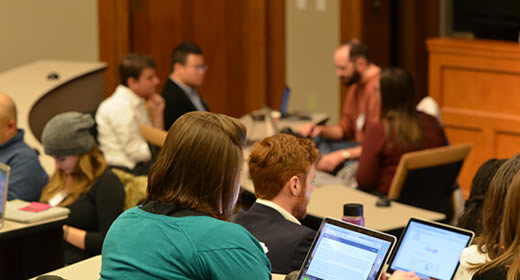
The Senate committee chair was overthrown, a protest stalled a House committee vote, and a single vote made the difference in protecting the environmental safety of the Great Lakes--all during the Ford School’s three-day Integrated Policy Exercise (IPE).
The one-credit requirement for Ford students is a simulation that tests their ability to make sound, responsible decisions under real-world time constraints and pressures. The simulation was taught by Professor Elisabeth Gerber and Ford School lecturer Conan Smith this January, a few days before most regularly scheduled classes at U-M begin.
Throughout IPE, students role-play legislative leaders, community stakeholders, media representatives, and research teams as a proposed bill is brought before the community to solve a pressing policy issue. Previous IPE topics have included Insuring Michigan’s Uninsured, Regional Transportation, and Detroit’s Economic Renewal.
In collaboration with Smith, a former Washtenaw County Commissioner, Gerber chose the topic of the future of the Enbridge Line 5 Pipeline for this year's exercise. Her goal was to get students to deepen their understanding and more fully appreciate the challenges of policymaking through discussions, readings, and feedback.
“We chose the topic of the Enbridge Line 5 Pipeline because we suspected that most students would have an initial knee-jerk reaction to the problem: shut the pipeline down!,” Gerber wrote in an email. “But that further consideration of the diversity of perspectives on the issue would cause them to challenge their initial assumptions. And wow, were we right!”
Enbridge, a Canadian oil company, transports oil and other petroleum through the pipeline from Wisconsin, through Michigan, to Ontario. The line, which has been in operation since 1953, runs across the Great Lakes under the Straits of Mackinac. After an oil spill from Enbridge’s Line 6 pipeline in Kalamazoo, MI in 2010, which caused concern for more potential environmental disasters and the desire to retire Line 5, opponents challenged the safety and necessity of the pipeline.
“It was a good topic this year,” said Kristina Kaupa (MPP ‘18), a graduate student instructor for the course. “It was straightforward, but also the deeper we went the more nuanced the issue became.”
Students were briefed on the issue from a panel in December, then completed written assignments about their characters and the policy issue leading up to the simulation. During the simulation, 162 students participated, acting as members of the oil industry; local, state and federal government agencies; lobbying groups; trade associations; and environmental and nonprofit advocacy organizations.
About 20 real world experts, like Mike Shriberg, regional executive director of the National WIldlife Federation’s Great Lakes Center, and Peter Langley, executive director of the Associated Petroleum Industries of Michigan (API-Michigan), spent time with the students in January, hosting sessions to further explain the issue and their stance on it.
The course made use of PolicyMaker, a digital tool Gerber developed with U-M's Office of Academic Innovation. The tool allows students to search for information, to post and read about each character involved, to email one another, and to share news updates in a form similar to Twitter.
While many students texted or met privately to make lobbying deals (and to avoid Freedom Of Information Act requests from the media), the pseudo-Twitter page provided entertainment and insight for all. The extension allowed students to post new resources, like agreement announcements, petitions, and press releases and to keep track of donations between lobbyists and government officials.
Gerber was pleased that this year's IPE accomplished her goals for student learning. “Through listening to discussions during IPE, talking with students afterwards, and reading their comments/feedback, I can see how participating in IPE caused them to deepen their understanding,” she said. “I think they more fully appreciate the challenges of policymaking.”
--Olivia Lewis (MPP '18)